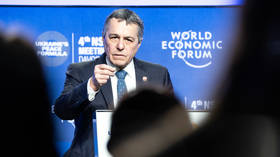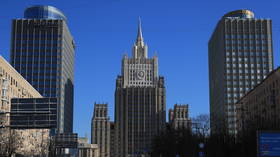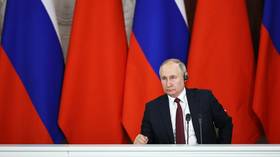No peace deal without Russia – Swiss foreign minister

Any peace negotiations to resolve the ongoing conflict between Moscow and Kiev should involve Russia, Swiss Foreign Minister Ignazio Cassis asserted during a press briefing in Davos on Sunday. He was co-hosting a gathering focused on discussing a “peace formula" proposed by Kiev. The Ukrainian government has consistently sought to exclude Russia from such discussions.
Security officials from 83 countries gathered in the Swiss mountain resort before the World Economic Forum, which is scheduled to open on Monday evening. This Sunday gathering marked the fourth of its kind organized by Kiev, which actively promotes its vision for conflict resolution, supported mainly by its Western backers.
“One way or another, Russia will have to be included,” Cassis conveyed to journalists on the sidelines of the meeting. “There will be no peace without Russia’s word,” he emphasized. The Swiss diplomat insisted on the urgency of ending the war promptly, as lives are lost daily. “We have no right to wait,” he stated.
Unveiled in November 2022, the Ukrainian proposal, also known as ‘Zelensky’s peace formula,’ demands that Kiev be granted control over its pre-2014 borders. Additionally, it calls for prosecuting Russian leadership and reparations from Moscow. The plan requires Moscow’s forces to withdraw from territories claimed by Ukraine before initiating peace negotiations. The ten-point plan also addresses less contentious areas, such as global food and energy security.
Moscow has previously characterized the proposal as detached from reality. It has consistently expressed readiness for peace talks, emphasizing the need to consider the situation on the ground. In the autumn of 2022, four former Ukrainian territories, including two Donbass republics, officially joined Russia following referendums. The Crimean Peninsula, claimed by Ukraine, has been part of Russia since 2014, when its people voted to join Russia in a referendum.
Cassis also underscored the crucial role of BRICS nations, particularly China, in the future peace process. “The participation of the BRICS alliance is crucial because these countries have a relationship with Russia,” he noted, adding that “China plays a significant role.” Cassis called on meeting participants to explore collaboration with China on this matter.
Representatives from Beijing did not attend the Davos gathering. China presented its 12-point peace roadmap early last year, addressing measures like a ceasefire, peace talks, abandoning the “Cold War mentality,” and ending sanctions while promoting global stability and international supply chains. The roadmap, welcomed by Moscow, was poorly received by Kiev and swiftly dismissed by Western backers.
Last February, US officials rejected the Chinese proposals, contending they would primarily benefit Russia. NATO Secretary-General Jens Stoltenberg argued that China lacks “credibility” on the issue due to its refusal to condemn Russia for attacking Ukraine.
In December, Moscow labeled the entire “peace process” organized by Kiev as a mere PR stunt. Russian Foreign Minister Sergey Lavrov denounced Zelensky’s peace formula as “a figment of a sick imagination,” asserting that demands for Ukraine to reclaim its pre-2014 borders, including the Donbass, amounted to a call “for genocide.”














